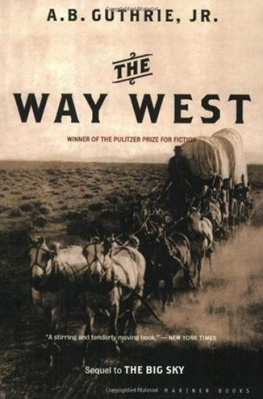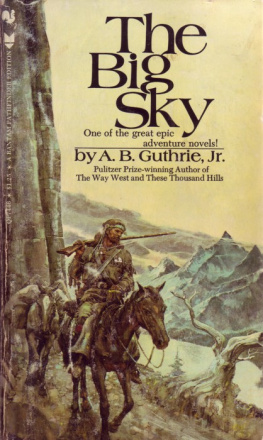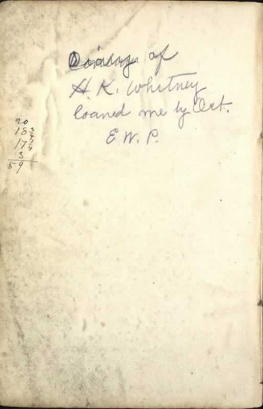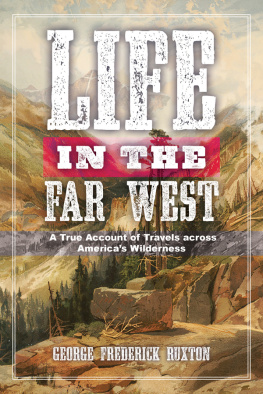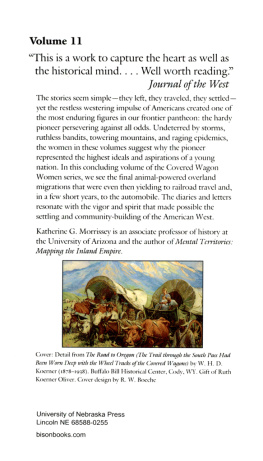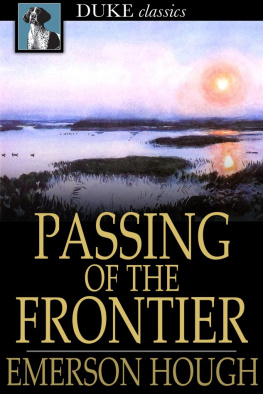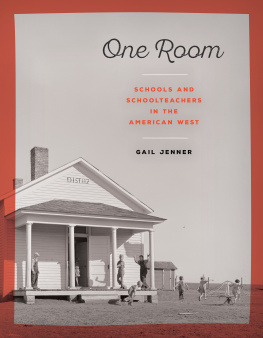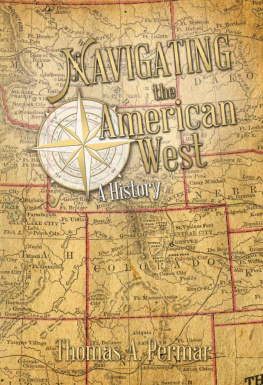
The Way West
A B Guthrie Jr
1949
To Harriet
Chapter One
THE DAY dawned clear, but it had rained the night before, the sudden squally rain of middle March. Taking a look out the kitchen door, seeing the path lead down to the muddy barnyard and the tracks of his shoepacks splashed in it, Lije Evans was just as well satisfied that things were wet. It gave him an excuse not to work, even if he could be mending harness or fixing tools. Not that he minded work; it was just that he didn't feel like working today.
"Likely I'll go to town, Rebecca," he said, closing the door.
"To talk about Oregon," she said, not quite as if she blamed him.
"Why, now," he answered, smiling at her while he lounged over to a stool, "I hadn't give a thought to what I'll talk about. I'll talk about whatever comes up." He knew she saw through him, and he didn't care. She always had seen through him.
"I don't know why everyone's gone crazy all of a sudden," she said while she wiped the last of the dishes and hung the towel on its peg. "Everyone talking about Oregon, and it so far away you can't think where."
"Not everybody. Not as many as will be."
"It'll blow over. You wait and see." She got the broom out of the corner. "I declare, that dog does track things up."
Evans looked down at Rock, who had let himself fall in the middle of the floor after leaving the marks of his big pads on the worn wood. "Rock's a good dog."
At the mention of his name, the dog lifted his head and got up slow and came over and put his chin in Evans' lap. He was getting old, Evans told himself, seeing the muzzle graying and his eyes beginning to shine dim with years. Rock was half hound and half no-one-knew-what, but he was a handsome dog, white and blue mixed, and a good one, too. "Reckon it's too much to ask him to wipe his feet before he comes in," Evans said.
Rebecca grunted to that while she swept.
"You can't go, boy," Evans said while he stroked Rock's head. "You chew up them town dogs too much. You'll get me in trouble one of these days, that's what you'll do."
"I ain't sure but what I'd say no. Of course you ain't goin', though. It's just talk."
"How's that, Becky?"
"No to Oregon."
"Now, Becky," he said, "don't be makin' up your mind independent. What if I should take it into my head to light out with the rest?"
She grunted again, and Evans knew it was because the thought of their splitting up was so outlandish. Another man, now, might not think she was much, heavy like she was and extra full-breasted, but she suited him, maybe as much for the way her mind worked as for anything else, maybe because she knew him up and down and inside out and still thought he was all right. A man got so he didn't see what other eyes saw; he got so that what he saw on the outside was what he knew lay underneath.
"Reckon Brownie wants to trail along with me?" he asked. "You heard him say he was goin' fishin'. He's diggin' worms now."
"Good thing to do."
"There's a heap of you in him," she said, looking at him. "You used to like fishin' and such."
"And I hate work."
"I didn't say that, Lije. It ain't so."
Evans had to smile inside. Every time he made little of himself, she said it wasn't so. "Oregon," he said, letting his thoughts drift, "it would be a good thing to a man, knowin' he had helped settle the country and so joined it to America." In his mind he went back over his words; they didn't tell what it was he felt.
Becky didn't answer.
"The huntin' and fishin' ought to be good in Oregon. Brownie would like that. A man wouldn't mess with rabbits and coons and possum there. Brownie wants to go."
"Last time you talked, it was the soil was so good."
"Soil, too. Everything."
"How you know?"
"It's what they say."
"Dick Summers don't think Oregon's so much, not for farmin'."
"Dick don't look on it that way, is all. He thinks about Injuns and furs and such. Farmin' don't come natural to him."
"He does all right."
"It still don't come natural. You can keep a varmint in a cage, but it don't come natural to him. Not that Dick's like a varmint."
"You ought to call round on him, Lije. Mattie looks awful poorly."
"Maybe I ought to."
She stepped over toward him. "Lije, we got Brownie to think of and all. Wouldn't do to act sudden about Oregon."
"No. But it wouldn't be so sudden."
"Well?" She strung the word out as she put the broom away.
Evans turned as the door opened and saw Brownie coming in and asked, "Want to go to town?"
The boy answered, "Don't guess so, Pa. It's a fishin' day today."
"It don't matter," Evans answered, still stroking the dog. ''Just thought maybe you was wore out with yourself." He let his eyes travel over Brownie. "I swear, boy, if ever you get meat on them bones, you'll be a sure-God man." Brownie was, Evans thought, close to a man already, long-boned and hard-muscled, with young whiskers on his face when he let them grow. A good hoy, he was, a shy and backward boy, just coming on to the time when things were hardest, when a man wanted women worse than ever in his life and didn't know how to hold himself in or let himself go, being awkward and afraid. "I hope you catch fish. I got a hunger for fish after all the salt pork and beans I've et." Evans got up. "I'll be goin'."
Rebecca came to the door as he let himself out. "Remember, Lije."
He nodded.
"You ain't as young as you were."
"Nobody is. But I ain't so old, neither. Thirty-five. A man's prime at thirty-five. Stay back, Rock."
She didn't say anything but closed the door slowly.
He went to the barn and saddled a mule. It was six miles to Independence. He would get there this side of midmorning if he moved right along, and some later if he let the mule laze. He let him laze.
He didn't guess he would join up for Oregon, for all that he would be proud to have a hand in it, to build up Uncle Sam and stop the British. Missouri was a good-enough country. A man could live, even if not fat, if he had a mind to work. He could live and fight fever and trade at the store and hope maybe someday to buy himself a nigger and so have more time for doing what he wanted to do. It wasn't that he wanted a passel of niggers and a big house and fancy horses, like some had in the cotton country in the south of the state. Maybe he didn't want even one nigger. He was a slave man himself, but still, come right down to the quick of it, he didn't know as one man had a right to own another, black or white. It was just that he wanted something more out of life than he had found.
It was likely a foolish business, this going to Oregon, but it was good to think about, like thinking about getting out of old ways and free of old places. Like his pa had said once, telling about coming down the Ohio in a flatboat, there wasn't any place as pretty as the one that lay ahead.
It was a time to think of moving, a time when the fields and trees, for all their raw and naked look, showed they knew spring was coming. The blood flowed quick in the body, and ideas came to a man. Once when his pa's house burned, catching fire in the stick-and-mud chimney, he had felt a little the same way, as if all the things he had been doing as a boy didn't need to be done any more, and he could strike out fresh and build his life as he wanted it. People sure would think he was crazy, knowing what was in his head.
The day would be warm, he thought, as the trail led out of a hunch of trees into a piece of prairie. He could feel the sun where his pants lay flat against his thigh. A woodchuck ambled in the grass and looked at him, and Evans figured he could shoot his eye out if he had his rifle with him. Mostly, now, he left the rifle at home, for it was heavy and he figured the country safe enough even if some others didn't.

